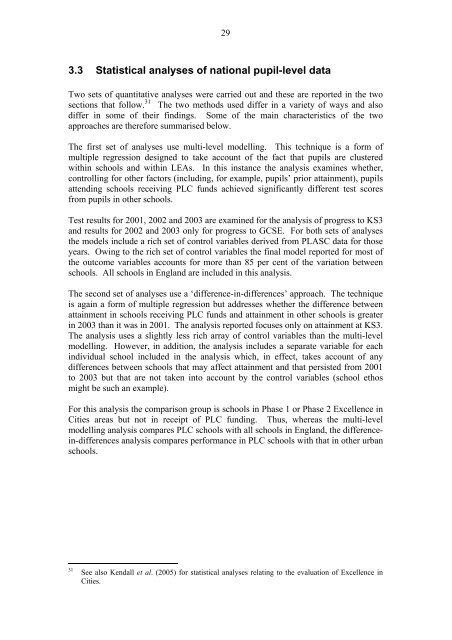Final Report of the Evaluation of the Pupil Learning Credits Pilot ...
Final Report of the Evaluation of the Pupil Learning Credits Pilot ...
Final Report of the Evaluation of the Pupil Learning Credits Pilot ...
You also want an ePaper? Increase the reach of your titles
YUMPU automatically turns print PDFs into web optimized ePapers that Google loves.
29<br />
3.3 Statistical analyses <strong>of</strong> national pupil-level data<br />
Two sets <strong>of</strong> quantitative analyses were carried out and <strong>the</strong>se are reported in <strong>the</strong> two<br />
sections that follow. 31 The two methods used differ in a variety <strong>of</strong> ways and also<br />
differ in some <strong>of</strong> <strong>the</strong>ir findings. Some <strong>of</strong> <strong>the</strong> main characteristics <strong>of</strong> <strong>the</strong> two<br />
approaches are <strong>the</strong>refore summarised below.<br />
The first set <strong>of</strong> analyses use multi-level modelling. This technique is a form <strong>of</strong><br />
multiple regression designed to take account <strong>of</strong> <strong>the</strong> fact that pupils are clustered<br />
within schools and within LEAs. In this instance <strong>the</strong> analysis examines whe<strong>the</strong>r,<br />
controlling for o<strong>the</strong>r factors (including, for example, pupils’ prior attainment), pupils<br />
attending schools receiving PLC funds achieved significantly different test scores<br />
from pupils in o<strong>the</strong>r schools.<br />
Test results for 2001, 2002 and 2003 are examined for <strong>the</strong> analysis <strong>of</strong> progress to KS3<br />
and results for 2002 and 2003 only for progress to GCSE. For both sets <strong>of</strong> analyses<br />
<strong>the</strong> models include a rich set <strong>of</strong> control variables derived from PLASC data for those<br />
years. Owing to <strong>the</strong> rich set <strong>of</strong> control variables <strong>the</strong> final model reported for most <strong>of</strong><br />
<strong>the</strong> outcome variables accounts for more than 85 per cent <strong>of</strong> <strong>the</strong> variation between<br />
schools. All schools in England are included in this analysis.<br />
The second set <strong>of</strong> analyses use a ‘difference-in-differences’ approach. The technique<br />
is again a form <strong>of</strong> multiple regression but addresses whe<strong>the</strong>r <strong>the</strong> difference between<br />
attainment in schools receiving PLC funds and attainment in o<strong>the</strong>r schools is greater<br />
in 2003 than it was in 2001. The analysis reported focuses only on attainment at KS3.<br />
The analysis uses a slightly less rich array <strong>of</strong> control variables than <strong>the</strong> multi-level<br />
modelling. However, in addition, <strong>the</strong> analysis includes a separate variable for each<br />
individual school included in <strong>the</strong> analysis which, in effect, takes account <strong>of</strong> any<br />
differences between schools that may affect attainment and that persisted from 2001<br />
to 2003 but that are not taken into account by <strong>the</strong> control variables (school ethos<br />
might be such an example).<br />
For this analysis <strong>the</strong> comparison group is schools in Phase 1 or Phase 2 Excellence in<br />
Cities areas but not in receipt <strong>of</strong> PLC funding. Thus, whereas <strong>the</strong> multi-level<br />
modelling analysis compares PLC schools with all schools in England, <strong>the</strong> differencein-differences<br />
analysis compares performance in PLC schools with that in o<strong>the</strong>r urban<br />
schools.<br />
31<br />
See also Kendall et al. (2005) for statistical analyses relating to <strong>the</strong> evaluation <strong>of</strong> Excellence in<br />
Cities.

















